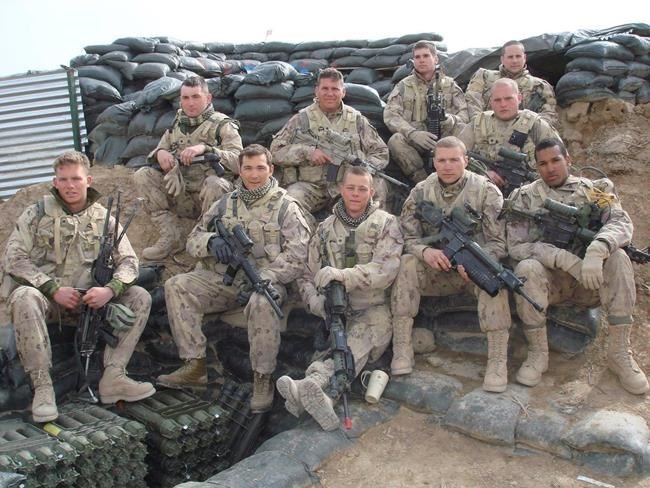PORT HAWKESBURY, N.S. — A Nova Scotia inquiry investigating why a former Afghanistan war veteran killed his family and himself in 2017 heard Tuesday from a federal lawyer who defended the work of Veterans Affairs Canada.
Lori Ward told the inquiry it would be wrong to blame the federal department for the deaths of Lionel Desmond; his 31-year-old wife, Shanna; their 10-year-old daughter, Aaliyah; and Desmond's 52-year-old mother, Brenda.
"It would be so easy to lay everything at the feet of Veterans Affairs," she said in her final submission to the inquiry, which was expected to conclude public hearings on Wednesday. "There's a narrative that is perpetuated about an uncaring bureaucracy."
Desmond served in Afghanistan as an infantryman in 2007 and was diagnosed with post-traumatic stress disorder and major depression in 2011. He was medically released from the army in July 2015 after receiving four years of treatment.
Ward drew attention to the work of Veterans Affairs employee Marie-Paule Doucette, who was appointed as Desmond’s case manager once he left the military. Doucette, Ward said, made every effort to help him deal with stress by using compassion and empathy, even though the case manager had a heavy workload.
Ward said Doucette made special requests to ensure Desmond received funding to cover the cost of travel for an intensive treatment program at Ste. Anne’s Hospital in Montreal. As well, she drove Desmond to the airport for that trip and, at one point, met with him in person during her vacation.
"Lionel Desmond had access to the best care at this time," Ward said.
Ward also made a point of listing the various treatments Desmond received in the military and after he left, saying the care he received at the federally funded Operational Stress Injury Clinic in Fredericton was considered the "gold standard" at the time.
On April 20, 2021, however, the inquiry heard testimony from a manager at Veterans Affairs, Lee Marshall, who said it took the department six months to appoint Doucette as case manager, a time lag that he agreed was not acceptable.
As well, the inquiry heard Desmond was still a desperately ill man when he left the mental health treatment program in Montreal on Aug. 15, 2016, and then returned home to Upper Big Tracadie, N.S.
At that time, Doucette requested to remain as Desmond's case manager, even though he had moved from New Brunswick to Nova Scotia, to ensure his continuity of care, Ward said.
But there were more problems. During the last four months of his life, Desmond received no therapeutic treatment, despite Doucette's efforts. Ward noted that Desmond sometimes missed appointments and failed to follow up with health-care providers.
At the time, Desmond required a functional assessment and a neuropsychological assessment, but that never happened.
Ward argued that Doucette was sometimes thwarted in her efforts to help her client because Desmond declined offers for assistance, especially if it meant travelling to Halifax, a three-hour drive from his home near Guysborough, N.S.
Between August 2016 and January 2017, Desmond’s mental health deteriorated, the inquiry heard.
"To say there was a gap in his treatment upon his discharge from Ste. Anne's … would be an understatement," the inquiry's lead counsel, Allen Murray, told the hearing Tuesday.
During that crucial period, Desmond sought help from two local hospitals in eastern Nova Scotia, but the doctors he met were unable to get his federal health records, which clearly spelled out just how ill he was.
"The depth and complexity of his mental health challenges can't be overstated," Murray said.
Ward argued that federal privacy laws had to be respected. And she insisted that Desmond could have easily obtained his own health records, despite his mental health challenges, which included a mild cognitive impairment.
At an earlier hearing, a Nova Scotia psychiatrist who accepted Desmond as a patient in 2016 said the former soldier appeared to be falling through the cracks in the health-care system in late 2016.
Ward challenged that view.
"In fact, far from falling through the cracks at Veterans Affairs, Mr. Desmond's decision to decline treatment … (in Halifax) and to try to find community supports in rural Nova Scotia amounted to a huge crack that Ms. Doucette and others were doing their best to have him navigate clear of," she said.
"Ms. Doucette is a person who went out of her way for Mr. Desmond, and yet she was asked (by an inquiry lawyer) if she felt contrition after he killed his family. Are you kidding me?"
In contrast, Murray said Tuesday it was clear Desmond had fallen into a "treatment void" that left him unable to recover from a “downward spiral.”
On another front, the inquiry learned that Desmond became increasingly paranoid about his wife's fidelity, and he also became more controlling, though there was no evidence of physical abuse.
“What the inquiry has heard is that, repeatedly, professionals may not have fully grasped the numerous red flags for the risk of serious domestic violence or domestic homicide," Murray said.
On Jan. 3, 2017, Desmond legally bought a semi-automatic rifle. Later that day, he used it to fatally shoot his family and himself in their rural home.
"His actions were the products of a damaged psyche and a tortured soul," Murray said. "It's a story of missed opportunities. It's a story of information that was siloed and went unshared. It's a story of many caring professionals who wanted to help, but ultimately could not.”
Other lawyers involved in the provincial fatality inquiry were expected to make their final submissions Wednesday.
The man leading the inquiry, provincial court Judge Warren Zimmer, is expected to produce a final report with findings and recommendations this fall.
This report by The Canadian Press was first published April 19, 2022.
— By Michael MacDonald in Halifax.
The Canadian Press
Note to readers: This is a corrected story. Previous version had 2020.




